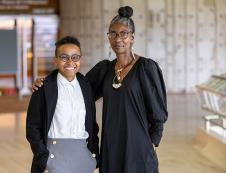
“I’m a Black woman so, there is no way for me to approach anti-racism without addressing feminism. As a woman of colour, you have to deal with every aspect of the oppression that affects you,” said Rokhaya Diallo, a French journalist, writer, filmmaker and commissioner of the O’Neill-Lancet Commission on Racism, Structural Discrimination and Global Health, co-chaired by the UN Special Rapporteur on the right to health.
Diallo spoke during the Enhanced Interactive Dialogue at the 57th session of the Human Rights Council in Geneva. The session, which featured the High Commissioner for Human Rights and the Expert Mechanism to Advance Racial Justice and Equality in Law Enforcement (EMLER) focused on systemic racism and intersectionality.
During the dialogue, UN Human Rights Chief Volker Türk presented a report that highlights intersectionality as a critical tool for addressing systemic racism and confronting legacies of enslavement and colonialism.
Türk’s report, which advances the implementation of his Agenda towards transformative change for racial justice and equality, explains that systemic racism is shaped by multiple and intersecting forms of discrimination. These occur when a combination of two or more grounds – such as race, gender, and others – interact with one another to produce distinct, unique and compounding experiences of discrimination.
“An intersectional lens exposes patterns of discrimination that may be hidden or overlooked in legal and policy frameworks and approaches for combating discrimination,” said Sara Hamood, chief of the Anti-Racial Discrimination Section in UN Human Rights.
“States and others can use it to identify how legal, institutional and policy frameworks may not serve specific groups of people who sit at the crossroads of interlocking systems of oppression. It does this by placing the lived experiences and solutions of those affected at the heart of policymaking and the evaluation of its effectiveness,” Hamood added.
The report found that long-standing leadership and advocacy – notably by women of African descent – has resulted in some Governments and other stakeholders increasingly seeking to apply an intersectionality framework when addressing discrimination and inequality. However, major challenges remain, particularly because full implementation of all components of this framework is still lacking.
The report recommends that States adopt policies and laws that prohibit direct, indirect, and intersecting forms of discrimination. It also calls for comprehensive data collection, disaggregated by race, gender, age, and other factors, with strong human rights and privacy safeguards.
Additionally, it urges States to ensure representation of people of African descent, especially women and youth, in all levels of government institutions, and their meaningful, inclusive and safe participation in public affairs.
States must also recognize that systemic racism today is the result of entrenched power structures and systems and harmful stereotypes, rooted in the legacies of historic injustices. Meaningful change can only be achieved by confronting those legacies and delivering reparatory justice.
“The High Commissioner’s agenda towards transformative change for racial justice and equality can support efforts to operationalize an intersectional approach,” Hamood said. “Moreover, recommendations and guidance by UN Human Rights, United Nations and regional human rights mechanisms are essential tools for making progress.”
Persistent violence and impunity
“Police violence is not analysed from the gender-based violence perspective, nor is an intersectional perspective incorporated in actions to address racist violence against people of African descent. Therefore, no action is taken on either side to respond to the specific needs of women of African descent,” said Paola Yáñez Inofuentes, an Afro-Bolivian human rights defender and regional coordinator of the Network of Afro-Latin American, Afro-Caribbean and Diaspora Women. Yáñez Inofuentes also took part in the interactive dialogue.
Yáñez Inofuentes highlighted the lack of data on how gender-based violence specifically affects women of African descent in Latin America. For example, across the region, data suggest that women are victims of femicide mainly at the hands of male partners or family members at home, however some recent studies have indicated that femicides against women of African descent often occurred in public spaces, at the hands of strangers.
“And that tells you that indeed it’s gender-based violence, but for women of African descent leaving their homes is already a risky situation. The right to the city is not the same for a white or mixed-race woman as it is for a Black woman,” Yáñez Inofuentes said.
“Women cannot live a life free from violence until we stop considering violence against women of African descent as being normal. There is not just one kind of woman and there is not just one kind of woman of African descent,” she added.
“
Without racial justice, no justice is possible.
“
Paola Yáñez Inofuentes, Afro-Bolivian human rights defender
Akua Kuenyehia, a Ghanaian lawyer, academic and chair of EMLER said, “The manifestations of systemic racism against Africans and people of African descent by law enforcement and in criminal justice systems are still predominant in many parts of the world, and broad impunity persists. Moreover, reparatory justice is long overdue.”
In its report, EMLER identified three minimum steps that States need to take to work towards justice, accountability and redress for people of African descent, which include the establishment of effective reporting, review, and investigation procedures, of independent civilian oversight bodies to law enforcement, and of independent mechanisms to support victims and communities.
The report emphasizes that impunity is the greatest challenge, and victims’ rights are rarely upheld.
“In the report, we conclude that is necessary for States to invest in the recommended strong institutions to provide justice, accountability, and redress,” Kuenyehia said.
Dialogues that enhance voices
Having a dialogue like this at the Human Rights Council is important because it gives a chance to affected individuals themselves to address the Human Rights Council, alongside NGOs and Member States, said Kuenyehia.
Diallo agreed.
“For someone like me, participating in this dialogue is an opportunity to leverage my voice and to connect to dynamics that are transnational and global, because we are living the legacies of transatlantic slave trade and colonialism,” Diallo said.
“And therein lies the richness of the interactive dialogues,” added Yáñez. “How they add to the process of building much more comprehensive and holistic agendas.”











